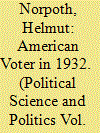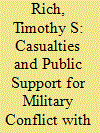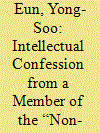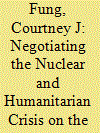|
|
|
Sort Order |
|
|
|
Items / Page
|
|
|
|
|
|
|
| Srl | Item |
| 1 |
ID:
165460


|
|
|
|
|
| Summary/Abstract |
Donald J. Trump won the 2016 US presidential election with fewer popular votes than Hillary R. Clinton. This is the fourth time this has happened, the others being 1876, 1888, and 2000. In earlier work, we analyzed these elections (and others) and showed how the electoral winner can often depend on the size of the US House of Representatives. This work was inspired by Neubauer and Zeitlin (2003, 721–5) in their paper, “Outcomes of Presidential Elections and the House Size.” A sufficiently larger House would have given electoral victories to the popular vote winner in both 1876 and 2000. An exception is the election of 1888. We show that Trump’s victory in 2016 is like Harrison’s in 1888 and unlike Hayes’s in 1876 and Bush’s in 2000. This article updates our previous work to include the 2016 election. It also draws attention to some of the anomalous behavior that can arise under the Electoral College.
|
|
|
|
|
|
|
|
|
|
|
|
|
|
|
|
| 2 |
ID:
165459


|
|
|
|
|
| Summary/Abstract |
In 1932, the American electorate was surveyed in a poll that has languished in the archives. The survey was conducted by Houser Associates, a pioneer in market research. It interviewed face-to-face a representative cross section about voter choices and issue attitudes. Although conducted on behalf of the Hoover campaign, the poll was not biased in his favor. The most striking revelation is that the electoral sway of the Depression was quite limited. The government was not seen by most voters as the major culprit or as having been ineffective in alleviating it. Even many FDR voters agreed. Moreover, there was no widespread “doom and gloom” about the future. What loomed larger in 1932 was the issue of Prohibition. The American people overwhelmingly favored repeal. The Democratic stand on it—that is, outright repeal—was a sure electoral winner, given Hoover’s staunch defense of Prohibition.
|
|
|
|
|
|
|
|
|
|
|
|
|
|
|
|
| 3 |
ID:
165457


|
|
|
|
|
| Summary/Abstract |
Previous literature on partisan campaign behavior shows that third-party candidates do not have the same presence online as major-party candidates, and these differences have been linked regularly to campaign finance. Twitter, however, has changed the online campaigning game. Because Twitter essentially is free, third-party candidates can even the playing field with major-party candidates who have more financial resources. The question asked in this article is whether this is actually the case. Evans, Cordova, and Sipole (2014) showed that in 2012, third-party candidates were less likely to have accounts on Twitter; however, those who had accounts tweeted more often than major party candidates. This article updates those findings to consider the behavior of third-party candidates during the 2014 and 2016 congressional races. Using a dataset of all candidates for both the US House and the US Senate, we show that the gap has begun to close between major- and minor-party candidates on Twitter. Third-party candidates, however, continue to have a different way of communicating with their followers on Twitter when compared to Democrats and Republicans.
|
|
|
|
|
|
|
|
|
|
|
|
|
|
|
|
| 4 |
ID:
165463


|
|
|
| 5 |
ID:
165461


|
|
|
|
|
| Summary/Abstract |
What explains the American public’s support for military conflict with North Korea? Despite increased rhetoric, few analyses address American public opinion or whether priming the public to consider casualties influences their perceptions. The results of an experimental survey design suggest that mentioning the human cost—even without explicit references to American casualties—reduces support for American military action against North Korea but not broader perceptions of North Korea.
|
|
|
|
|
|
|
|
|
|
|
|
|
|
|
|
| 6 |
ID:
165475


|
|
|
| 7 |
ID:
165478


|
|
|
| 8 |
ID:
165472


|
|
|
|
|
| Summary/Abstract |
In recent work, Teele and Thelen (2017) documented the underrepresentation of female-authored scholarship in a broad selection of political science journals. To better understand these patterns, we present the results of an original, individual-level survey of political scientists conducted in the spring of 2017. Confirming Teele and Thelen’s speculation, our evidence indicates that differences in submission rates underlie the gender gap in publication—a pattern particularly pronounced for the discipline’s “top three” journals. Leveraging original survey items, we pursue explanations of the submission gap, finding that both methodological specialization and attitudes toward publication strategies play roles. Importantly, we also conclude that men and women obtain differential returns on their investments in coauthorship: although male and female respondents report identical propensities to coauthor, coauthorship boosts submission and publication rates more strongly for men than women. We discuss the implications of our findings for ongoing conversations about inequality in political science.
|
|
|
|
|
|
|
|
|
|
|
|
|
|
|
|
| 9 |
ID:
165466


|
|
|
| 10 |
ID:
165476


|
|
|
| 11 |
ID:
165483


|
|
|
|
|
| Summary/Abstract |
This article explores how the musical Hamilton can be used as a way to bring students to a new understanding of American government at the introductory level. As a recent pop-culture smash, Hamilton has brought to the fore the possibility of a new civic conversation about our political beginnings. With many citizens lacking a sufficient understanding of American political culture at this fraught time, the introductory American government course is the ideal place to enhance civic understanding. This article discusses how music from the Hamilton cast album, as well as videos about the show, were used during two semesters of the introductory American government course at a regional public university. Doing so encouraged discussion and active learning about key concepts and critical moments in American history that have shaped politics through the present day.
|
|
|
|
|
|
|
|
|
|
|
|
|
|
|
|
| 12 |
ID:
165473


|
|
|
|
|
| Summary/Abstract |
David Lake wrote that International Relations (IR)1 will be a more diverse and better field of study if we embrace varied “life experiences and intuitions,” especially those of “marginalized” scholars, about politics and how the world works. Although concurring with his admonition, I also believe that his call for “greater diversity” in IR and his approach to realizing it need to be subject to critical scrutiny, being reconsidered in terms of reflexivity—more specifically, self-reflection by “marginalized” scholars. For this reason, as a “non-white” scholar working in a “non-Western” (or, in Lake’s words, “underrepresented”) IR community, I want to make my own confession to better understand what is at stake in promoting diversity in the academy from a different angle.
|
|
|
|
|
|
|
|
|
|
|
|
|
|
|
|
| 13 |
ID:
165462


|
|
|
| 14 |
ID:
165479


|
|
|
| 15 |
ID:
165464


|
|
|
| 16 |
ID:
165482


|
|
|
|
|
| Summary/Abstract |
Teaching undergraduate students, mentoring graduate students, and generating publishable research are distinct tasks for many political scientists. This article highlights lessons for merging these activities through experiences from an initiative that sparked a series of collaborative-research projects focused on opinions about crime and punishment in the United States. This article describes three collaborative projects conducted between 2015 and 2017 to demonstrate how to merge undergraduate teaching, graduate training, and producing research. By participating in these projects, students learned about social-scientific research through hands-on experiences designing experiments, collecting and analyzing original data, and reporting empirical findings to a public audience. This approach is an effective way to engage students and generate research that can advance professional goals.
|
|
|
|
|
|
|
|
|
|
|
|
|
|
|
|
| 17 |
ID:
165468


|
|
|
| 18 |
ID:
165481


|
|
|
|
|
| Summary/Abstract |
This article describes a simulation scenario based on of-the-minute thinking about the Korean Peninsula crisis. The scenario highlights the tradeoffs and difficulties in addressing the nuclear and humanitarian crisis, tasking students to negotiate to reach consensus on track I and track II levels. Students are negotiators, gaining experience and exposure to key international relations and political science concepts through active learning. An optional media-teams and press-conference component also is discussed. The scenario, grading rubric, and supplemental materials are included to give instructors a resource that is easily modified across groups varying in size, ability, and composition.
|
|
|
|
|
|
|
|
|
|
|
|
|
|
|
|
| 19 |
ID:
165458


|
|
|
|
|
| Summary/Abstract |
Political research on social media argues that new channels of technological communication influence political leadership. However, we do not know the extent to which social media affect the power of other authorities—for example, religious leaders—in the secular world. This article focuses on the social media presence of the Pope. I argue that the pontiff uses social media communication to explicitly address certain political issues. Specifically, I claim that his messages on the web tend to be more political when critical world events threaten peaceful international relations and frighten salient religious minorities. I investigated this argument by studying Pope Francis’s statements on Twitter. The analysis indicates that the Pope is more likely to release political tweets during international crises, thus targeting issues that otherwise belong to other secular authorities. At the same time, it “normalizes” the Catholic Church’s power in that it allows the Pope to maintain the Vatican’s long tradition of safeguarding peace and protecting vulnerable populations. These findings have implications for the leadership of the Catholic Church in the modern world and extend to other papacies beyond Francis’s.
|
|
|
|
|
|
|
|
|
|
|
|
|
|
|
|
| 20 |
ID:
165469


|
|
|
|
|
|
|
|